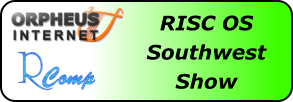The first is to use a time machine1
The second method is much easier. All you need to do is be in Cambridge – more specifically the Centre for Computing History – on Saturday, 21st and/or Sunday, 22nd September, because that’s when the museum will be holding its own Acorn World event – as it has done for the last couple of years.
The Centre for Computing History,
Rene Court,
Coldhams Road,
Cambridge,
CB1 3EW.
The purpose of the event is to showcase the, er, world of Acorn, with exhibits and information telling the company’s story. Starting with its beginnings over forty years ago in 1978, visitors will be able to follow it through the glory days of the 1980s with successes such as the BBC Microcomputer and the development of the ARM CPU, into the 1990s and, ultimately, the end of the road for Acorn – though not for its legacies, such as that now ubiquitous CPU.
Almost all of the machines produced by Acorn will be on display, including a number of one-of-a-kind prototypes. That’s a range of hardware extending from early, 8-bit kit form computers, through to 8-bit and 32-bit machines aimed at home, education, and business users – and that’s without considering the prototypes and ideas – so there is sure to be something for everyone.
An event within the event, the Acorn and BBC Micro User Group will be holding one of their meet-ups at the museum the same weekend, so if you want to see what they do – or even participate – look for the “80s classroom”, where they’ll be working on and showing off new projects for (and on) old kit, be that hardware add-ons, new games, or anything else that may have sparked their imagination.
On the Saturday evening from 6:00pm there will also be a Q&A session with two Acorn alumni – Jonathan Griffiths, and Alex van Someren.
Jonathan joined Acornsoft in 1981, where he wrote some early Acorn classics such as Snapper (a Pac-man clone), and Rocket Raid (a take on Scramble). He later wrote a book called Creative Assembler (a how-to for would-be games developers), and also contributed to the Domesday Project, a joint effort between the BBC and Acorn, amongst others, to mark the 900th anniversary of the Domesday Book using the technology of the day.
Alex, on the other hand, began his time at Acorn while he was still at school, and in 1993 he and his brother Nicholas started ANT Ltd, through which they initially developed networking add-ons, and later such well known software as the ANT Internet Suite, which included the Fresco web browser. Amongst other things, Alex also co-wrote The ARM RISC Chip, A Programmer’s Guide – the first book about the ARM RISC architecture and how to program it.
Access to the event is through the same route as normal admission into the museum – so just £9.00 for either day for an adult, dropping to £6.00 for a child, with the option of a family ticket (two adults and two children) for either day costing £26.00, all of which can be ordered in advance.
!Readme
- If you do have access to a time machine you could visit events organised by Acorn themselves in the 1990s. These events may not have taken place in September, but that’s the beauty of time travel – you could head back to them in September of this year. However, time travel can be a bit tricky unless you know what you’re doing – and even then, mistakes are so easy to make2 – so it’s probably best to avoid that option.
- What if you accidentally changed the course of computing history, for example, so that Microsoft became the dominant player on PCs used in the office, and thence in the home? Oh, drat – it looks like someone’s already messed things up!



